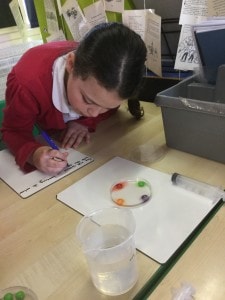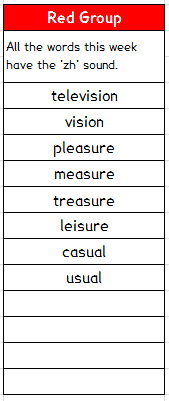29 April 2016
This week’s Talk Time homework is due on Friday 6 May (not Wednesday 4 May)
To be able to talk confidently about my chosen person that I’ll write my biography on on Friday 6 May.
All of the children have chosen somebody that they’d like to write a biography on, having learnt all about how to write them in our English lessons. It is their responsibility to find out about this person and be ready to write about them at the end of next week.
Don’t forget to create some notes for you to refer to when you’re writing.
Gymnastics
We’ve been working hard to improve our gymnastics skills in PE today. We’ve practised different types of balances, jumps and travels. We’ve also climbed, dangled and swung on the big gym apparatus.
I wonder…
Each week, Year 5 are donning their lab coats and goggles (metaphorically) and becoming scientists. Last week, we used our observation, questioning and planning skills with just water, skittles and a petri dish.
From such simple equipment, it was fascinating to see what happened and we took careful observations of what we could see.

Once we’d seen what happened, we had some question starters to help us to think about any questions we had as a result of this experiment.

From these question starters, we identified which questions could be researched and further our knowledge and which questions were testable. Focussing on the testable questions, as a group we chose something to test in next week’s science lesson:
What if you use use liquids other than water?
What if you use different sweets?
I wonder what would happen with different numbers of skittles?
We’ll be finding out what will happen by conducting these experiments on Friday 29 April so we’ll keep you updated.
Phonics mornings
Our final phonics mornings of the year will be held on Wednesday, Thursday and Friday.
It is really important that you attend to find out how your child has progressed and to learn more about how to support your child in the next phase of their learning.
Phase 4
Children will continue to practise previously learned graphemes and phonemes and learn how to read and write:
CVCC words: tent, damp, toast, chimp
For example, in the word ‘toast’, t = consonant, oa = vowel, s = consonant, t = consonant.
and CCVC words: swim, plum, sport, cream, spoon
For example, in the word ‘cream’, c = consonant, r = consonant, ea = vowel, m = consonant.
They will be learning more tricky words and continuing to read and write sentences together.
Tricky words
said, so, do, have, like, some, come, were, there, little, one, when, out, what
Triathlon volunteers
Organisers for the Columbia Threadneedle World Triathlon Leeds have officially launched the search for 750 volunteers, to help ensure the event is one of UK sporting highlights of the year.
From experienced volunteers to complete beginners, organisers hope to encourage people of all ages to get involved in a world-class sporting event by becoming a Leeds City Ambassador. There will be a variety of roles for volunteers at the UK leg of the ITU World Triathlon Series including: race officials, supporting participants along the course, handing out drinks, or giving medals to finishers in the mass-participation races, to name just a few. Volunteers can provide their time for three days from Friday 10th to Sunday 12th June, including the GO TRI event on the Saturday, or for just one day, by applying online at the official 2016 Columbia Threadneedle World Triathlon Leeds website: http://leeds.triathlon.org/volunteer/ and completing the application form. Once potential volunteers have completed the online application form, they will be assigned a role, dependent on experience, and informed of their responsibilities via email. Prior to June 12th, there will also be an exclusive pre-event briefing for volunteers that will include: training, logistics, and a chance to meet the organisers. All volunteers will receive an event t-shirt, refreshments and a huge thank you from the organising team and those taking part for their hard work.
22 April 2016
The homework for this week is creative and is due in on Wednesday 27 April.
I can create some flower art.
As we are learning about flowers (specifically sunflowers) in our mini-topic, I would like children to create some art using flowers or plants as a stimulus. They could:
- find a green space and sketch or paint some flowers
- sketch or paint a vase of flowers
- create a collage
- use flowers or plants to create a piece of art
- focus in on one particular part of a flower or different flowers – such as petals or leaves
22 March 2016
This week’s spellings end in ‘-sure’ and ‘-ture’.
measure
treasure
pleasure
enclosure
creature
furniture
picture
nature
adventure
Your child has nine spellings to learn and must find their own tenth spelling that ends in either ‘-sure’ or ‘-ture’. They will be tested on seven of these spellings and their own word next Friday.
22 March 2016
This week’s homework is practice makes perfect and is due on Wednesday 27 April.
I can interpret circuit diagrams.
As part of our Science led mini topic ‘Power’, we have been learning about circuits. Your child has a booklet of activities to use and apply their learning. If your child needs some extra help, click here to find a website that lets your child create and test their own circuits.
22 April 2016
The homework for this week is creative and is due in on Wednesday 27 April.
I can create some flower art.
As we are learning about flowers (specifically sunflowers) in our mini-topic, I would like children to create some art using flowers or plants as a stimulus. They could:
- find a green space and sketch or paint some flowers
- sketch or paint a vase of flowers
- create a collage
- use flowers or plants to create a piece of art
- focus in on one particular part of a flower or different flowers – such as petals or leaves
22 April 2016



